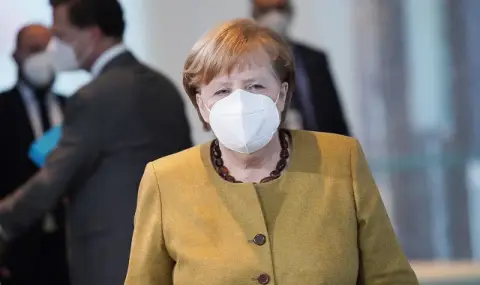Angela Merkel vehemently defends her 16 years at the helm of Germany in her autobiographical book, titled "Freedom" and published today in about thirty countries.
The 70-year-old former chancellor today faces accusations that he allowed Germany to develop a dangerous dependence on cheap Russian gas and contributed to the rise of the far right with his open-door policy on migrants.
Merkel, who has been absent from the political debate since stepping down at the end of 2021, is taking the floor again at a time when the agenda is marked by the wars in Ukraine and the Middle East, by the imminent return of Donald Trump to The White House and from the pre-election campaign in Germany for early parliamentary elections in February.
Refugees
Merkel has never been more criticized than for her handling of the migrant crisis, when she ordered migrants arriving in September 2015. at the borders of the country, not to be returned. Explaining her motives at the time, she noted that she wrote her memoirs guided by her "vision of Europe and globalization.
Uttering a phrase that has become iconic - "We'll get through this" (in German: "Wir schaffen das"), she demonstrates an approach that can be summed up by the phrase: "If there are obstacles, work must be done to overcome them".
Regarding her selfie with a Syrian refugee, she says she "still doesn't understand how it can be assumed that a smile in one photo could be enough to make thousands of people leave their country.
Merkel points out that "Europe must continue to protect its external borders", but at the same time emphasizes that "prosperity and the rule of law are why Germany and Europe continue to be (. . .) places where people want to go".
Regarding the rise of the German far-right formation "Alternative for Germany" (AzG) Merkel warns the democratic parties that if they "think to contain the rise of the A&G by constantly engaging with its themes or playing rhetorical leapfrogging without offering concrete solutions to the existing problems, they will fail".
Energy
Since Russian forces invaded Ukraine in February 2022, Merkel has been accused of making Germany dependent on Russian gas supplies.
On this issue, Merkel emphasizes that the creation of the gas pipeline "Nord Stream 1" was signed by her predecessor, the Social Democrat Gerhard Schröder, who subsequently became chairman of the shareholders' committee and the supervisory board of this company.
On "Nord Stream 2", the second gas pipeline that never went into operation that she gave the green light after the annexation of Crimea in 2014, Merkel explains that at the time it was "difficult to it is accepted both in Germany (. . .) and in other EU member countries" that more expensive fuels must be imported from elsewhere.
She justifies the choice to phase out nuclear energy, which she decided in 2011. after the disaster at the Fukushima nuclear power plant: "natural gas more than ever played the role of transition fuel", waiting for renewable energy sources to take over.
Merkel recommends that Germany not return to nuclear power, as some have suggested: "we don't need it to achieve our climate goals, to perform well technologically and to inspire other countries to do so" .
Russia
No other leader is as criticized in Merkel's memoir as Russian President Vladimir Putin. She describes Putin as "a man who is always on his guard, who is afraid of being mistreated, and who is always ready to strike, including by demonstrating his power, playing with a dog and making others wait.< /p>
However, she points out that she "continues to think" that "despite all the difficulties (. . .) she did well to stick to (. . .) not letting contacts with Russia stop (. . .) and to preserve ties through commercial relations that were beyond mutual economic benefits".
Since, she emphasizes, "Russia, along with the United States, is one of the two main nuclear powers in the world" and is a neighbor of Europe.
She also defended her opposition to Ukraine joining NATO at the Bucharest summit in 2008, arguing that candidate status would hardly protect Ukraine from Putin's aggression.
Translation from French: Bozhidar Zahariev, BTA
